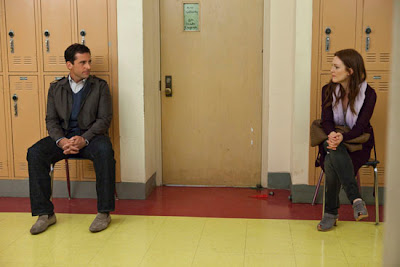Thinking about it almost a week later, it strikes me as a movie that would have worked as an anthology film, something along the lines of "New York, I Love You". There are a number of funny, quirky and interesting characters and situations, and the attempt to bring them all together seems forced. Taken on their own, with a bit of polishing, each gives us the pleasures of an easy-reading short story.
The numerous plots and subplots could, I think, be material for separate films, if the ideas were given time to breathe, and mature, and were developed thoughtfully.
Steve Carrell plays Cal, the same sad-sack romantic he portrayed in "Dan in Real Life". Here, Cal has fallen into a rut, caring nothing of his appearance, the fit of his clothes, or how to keep his wife, Emily, interested in their marriage. Emily (Julianne Moore, again cast as the cheating wife with pangs of regret) is having an affair with co-worker Kevin Bacon (looking gaunt here) and, as the movie begins, asks Cal for a divorce.
Cal, who is lonely and hangs out in a bar telling his tales of woe, attracts the attention of Jacob (Ryan Gosling), a handsome womanizer with well-tailored clothes and great shoes (the movie wants to be trendy, and concerned with surface appearances; it includes an opening montage that seeks to tell us everything we need to know about couples' relationships by focusing on their shoes).
That Jacob would take Cal under his wing, convince him to buy a killer wardrobe, and coach him in the art of seducing women, to "make a man out of him", lends the film a strange kind of comic suspense. We wonder what's in it for Jacob, and we wonder why Cal is so easily lead into the situation. (It's also a little chauvinistic, which made me wonder if the studio "suits" meddled with the original concept.).
I liked the chemistry between Gosling and Carrell in the first half of the film.
But there is much more going on. Emily and Cal's son Robbie is in love with Jessica, an older girl from High School who happens to be his babysitter. Jessica, meanwhile, has a schoolgirl crush on Cal. So we have parallel stories of the near-impossibility of May-December romances.
In other developments, Emma Stone appears as Hannah, a new law-school grad who is on the brink of a new life and, possibly, a new husband, and who is the only woman to spurn Jacob's advances. Soon, a crushing disappointment sends her back to him, with Jacob disbelieving his good fortune. The affair that develops between them, which seeks also to explain Jacob's womanizing behavior and the reasons for his surprising loneliness, has an easy, natural rhythm. Gosling is a charmer, which he demonstrated in the much bleaker "Blue Valentine". A lesser actor would have let his naked abs and pecs do the acting for him.
I loved Emma Stone. She has a freshness, the tomboy mischief and grit of a young Jodie Foster but warmer, more humorous. This is the first film I have seen Stone on-screen, and I am anxious to watch her again. The film benefits from Hanna's energy, and for the most part Dan Fogelman's screenplay honors her character. Her scene with Gosling on their first "date" could be the basis of a fascinating contemporary love story all its own.
So then, on top of these plot-lines-- Carrell's and Moore's troubled marriage; Moore's guilt at her affair with Bacon; the double crushes between the son and the babysitter, and the babtsitter and Carrell; the wonderful budding romance between Stone and Gosling; and the unusual and mysterious comic "bromance" between Gosling and Carrell-- there's MORE! There's a subplot involving Carrell and a sexually voracious woman he meets in a bar (Marissa Tomei); a shocking revelation about Robbie's schoolteacher; and a revelation about Stone's character that brings ALL the plots together in an unlikely comic climax...well, I'm a bit out of breath just recounting it all.
Nonetheless, the movie, while overwritten, is at least "written", and I am grateful for that. "Crazy, Stupid, Love" holds together in spite of all the reasons it shouldn't: the extraneous sublots, the one-plot-twist-too-many, the incongruous humor, the attempt to make Gosling's character cuddly and the Carrell character a wise old man. Most of all, I was not convinced that Hannah wouldn't have been more involved with a certain family incident (no spoilers here); or that Carrell, who is almost desperately in need of Gosling's approval and friendship, would turn on Gosling so suddenly during the climactic revelation.
A final word about the title. I still can't fathom its use of commas. If "love" is defined as "crazy" and "stupid", the commas are misplaced. That's actually important. If you read "Eats Shoots and Leaves", or recall the censorship uproar over Woody Allen's early satire "What's Up, Tiger Lily?" (say the title without the comma and see how much more risque it is), then you understand that punctuation matters. In this case, it seems like a mistake, unless "love" is used as some kind of an adjective. Grammar lesson over.





No comments:
Post a Comment